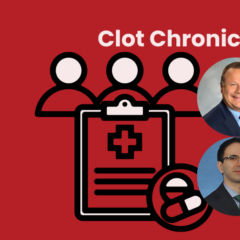Last updated on
Clot Chronicles: Protecting Patients After Hip and Knee Surgery
Dr. Sam Goldhaber discusses a recent study “Aspirin or Rivaroxaban for VTE Prophylaxis after Hip or Knee Arthroplasty” and the importance of anticoagulation after hip and knee surgery.
Hello, this is Dr. Sam Goldhaber. I’m president of NATF and I’m speaking today on the Clot Chronicles on the topic of preventing pulmonary embolism (PE) and deep vein thrombosis (DVT) in patients undergoing either total knee replacement or total hip replacement.
It turns out that the number one complication after total knee or a hip replacement has nothing to do with the orthopedic device that’s inserted into the knee or hip. The number one complication is pulmonary embolism and DVT. How should we best prevent this?
Well, the guidelines are not very useful because they say you can do almost anything. Low dose aspirin, low molecular weight heparin, warfarin, or novel oral anticoagulants are all considered to be acceptable approaches to the prevention of venous thromboembolism after knee or hip surgery, specifically total knee replacement or total hip replacement.
Recently, in the New England Journal of Medicine, a study (Aspirin or Rivaroxaban for VTE Prophylaxis after Hip or Knee Arthroplasty) was published where patients all received up front, five days of the NOAC rivaroxaban. They received ten milligrams daily for five days and then they were randomized either to continue rivaroxaban for two to four weeks and the other group that did not receive rivaroxaban, received low dose aspirin. And at the end of the study the event rates for pulmonary embolism and DVT were thankfully, very, very low in both groups and there was no significant difference using the hybrid approach of rivaroxaban, switching to low dose aspirin after five days versus continuing just rivaroxaban alone for two to four weeks.
So, this gives us another potential approach in our query and wish to stop DVT and pulmonary embolism after total knee replacement and total hip replacement.
I personally, along with Kathryn Mikkelsen at NATF and others, we are involved with a study called the PEPPER Trial. This study will enroll twenty-five thousand patients across the USA undergoing total hip or knee replacement, and they are being randomized to one of three groups: low dose aspirin, or rivaroxaban ten milligrams a day, or warfarin with the target INR between 1.7 and 2.0.
The idea is to see which of these three regimens will have the lowest risk of venous thromboembolism.
We should have the results in about five years, but in the meantime there are multiple approaches that are considered acceptable. I think the main thing is to be certain that some approach is being used with some type of pharmacological agent such as aspirin, or oral anticoagulants, or injected anticoagulants. Use some approach to prevent DVT in this vulnerable population.
This is Dr. Sam Goldhaber signing off.



